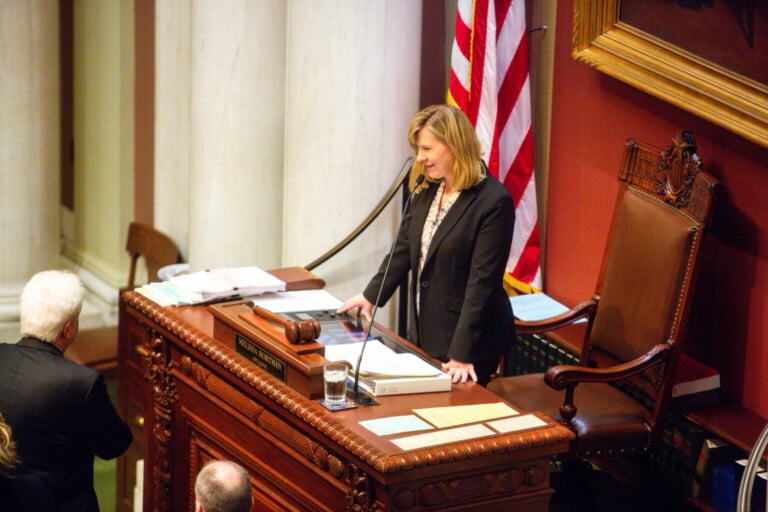Remembering Melissa Hortman: Republicans and Democrats say her power came from her selflessness

ST. PAUL, Minn. (Minnesota Reformer) — Heading into the momentous 2023 legislative session, then-House Speaker Melissa Hortman was dealing with big, fractious and ideologically diverse personalities in her caucus.
“Dave Lislegard and I had been in a hot war with each other for two years,” said Rep. Aisha Gomez, a Minneapolis Democrat with punk rock tastes and socialist politics.
Lislegard is a self-described “Iron Range old-school Democrat.”
Hortman’s plan was to have them take the lead on taxes, which would be an important policy lever as Democrats sought to spread Minnesota’s prosperity more widely.
“I didn’t know how it would work out,” Lislegard said in an email.
Hortman persisted: “You guys are closer than you think,” she told Lislegard.
The result was a massive tax bill that created a steeply graduated child tax credit, among other progressive achievements.
“Melissa saw what no one else did,” Lislegard said. “She had an ability to see what’s in people’s hearts and how we could take the best parts from our own unique backgrounds to build a partnership.”
Gomez and Lislegard say Hortman’s matchmaking fostered both a tax bill — and a lifelong friendship. But Hortman wasn’t doing it just to make friends.
It was a “totally shrewd move,” Gomez said, cementing the loyalty of the farthest right and left flanks of the Democratic-Farmer-Labor House caucus, which was key to securing the votes Hortman needed to pass Minnesota’s most ambitious legislative agenda in decades.
Hortman’s politically motivated assassination this month has left Lislegard and Gomez – and the entire state – in shock and grief.
“She was an amazing friend,” Lislegard said, “and I already miss her terribly.”
The Reformer interviewed nearly two dozen legislators of both parties, Capitol staff, political operatives, and the many Hortman alums who have gone on to successful careers in business, law and public service thanks to her mentoring.
The portrait that emerges is of an unusual politician: She merely tolerated the spotlight, happily shared credit and accepted blame, eschewed higher office, and by all accounts was motivated chiefly by an interest in public policy, its details and how it could help as many Minnesotans as possible.
Hortman, a Catholic Sunday school teacher, was also guided by an insight often lost on elected officials.
“Selflessness enhances power. Strong leaders understand that,” said Larry Redmond, a DFL lobbyist whose political resume includes working as a political aide to Hubert Humphrey.
Put another way, “She wasn’t about the bullshit,” Gomez said. “The TV cameras or the next higher public office. Or about being glorified or having everyone like you. She was about doing the best she could do for the most people.”
On Friday, June 26, she will be the first woman in Minnesota history to lie in state at the Capitol, along with her husband Mark Hortman and their golden retriever, Gilbert.
Losses and reused yard signs
Hortman began her own political career by losing — twice, in 1998 and again in 2002.
“Adversity is a good teacher,” Redmond said.
From those defeats and her time representing a swing district, Hortman learned the importance of maintaining contact with voters, especially by knocking doors — thousands of them. Years later, as a caucus leader, she also never forgot what it was like to defend a battleground.
In 2004, she hired future DFL Rep. Zack Stephenson as her campaign manager as an early 20s college student with no political experience in what would become another pattern: nurturing talent.
Hortman’s lawn signs in 2004 said “It’s time to get the job done” and made the pitch that unlike the incumbent, she would get the north metro a fair share of road and bridge money.
She won by a few hundred votes in the same year Republican President George W. Bush won her district.
When she ran for reelection in 2006, she was worried about reusing the slogan “It’s time to get the job done,” because she was now the one doing the job.
“Melissa was frugal and really hated waste, so she didn’t get new lawn signs. She just cut the (old slogan) off all the lawn signs, hundreds of them,” Stephenson said.
A wonky policy profile with roots in environmentalism
Growing up, Hortman’s family owned a junkyard, and she prided herself on understanding blue-collar small business people, but she’d also been educated at Boston University and the University of Minnesota Law School.
She took up the wonkiest of subjects: Energy law and what was then only just emerging as a major policy issue — climate change.
She fought against the powerful auto dealers’ lobby — and some in her own caucus — in a seemingly quixotic battle to adopt stricter tailpipe emissions standards, which would come to fruition more than a decade later when Gov. Tim Walz used rulemaking to adopt the standards.
In 2007, she played a role in passing a mandate for Minnesota utilities to generate 25% to 30% of their electricity from renewable sources by 2025, an optimistic target at the time which the state reached early.
She was also author of a landmark 2013 law that set solar energy standards for Minnesota utilities and kickstarted what was for several years the country’s leading community solar program.
“We called her the godmother of solar in Minnesota,” said Logan O’Grady, executive director of the Minnesota Solar Energy Industries Association.
When then-Gov. Tim Pawlenty vetoed a transportation bill after the I-35 bridge collapse, Democrats appointed her the chief spokesperson during the floor debate over overriding the Republican governor’s veto.
“Here is someone in their second term and is being called upon to navigate what was probably the most significant floor debate of that decade,” said former DFL Rep. Frank Hornstein. “We prevailed, and it felt like winning the Super Bowl.”
Later, she’d become known as a legislative fixer who could pick up an ailing piece of legislation and yank it across the finish line, as with a foreclosure reform bill in the wake of the housing crisis of the Great Recession. (Fresh out of law school years before, she’d worked for Central Minnesota Legal Services, where she won a then-record-setting verdict in a housing discrimination lawsuit.)
While her interest remained policy, Hortman was developing a theory of elections, politics and power.
Democrats would wind up losing the majority during the 2010 Republican wave that swept all the way to Washington, and Hortman often relayed what a voter told her that year: He didn’t care what she had done in the Legislature. He was sending a message to Democrats.
This humbling moment was so seared in her brain that she would repeat it to legions of legislators and operatives over the years: Voters mostly don’t know who their legislator is, and they care even less.
The national political atmosphere will determine the outcome of most elections.
Within those constraints, however, candidates could eke out enough votes on the margins to win the close races that frequently determined control of the House.
And the best way to do that was by knocking doors and having face-to-face interactions that voters would appreciate and remember.
Later, as caucus leader, she kept a tally of the members’ door knocking stats and sent out an email with everyone’s scores, including her own. The message was clear: If you want a good committee gavel, you need to do the work. After a doorknocking session, known as “Speaker knocks,” they’d retreat to a local bar for fellowship.
The doorknocking also informed governing, as the conversations helped Democrats create an agenda that people wanted.
Her approach to power was similarly grounded in the knowledge that it was fleeting.
When Democrats controlled both chambers of the Legislature and the governor’s office in 2013-14, they debated how boldly they should govern, with an eye on the 2014 midterm election.
On issues like a gas tax increase for transportation, drivers licenses for undocumented people and restoring ex-felons’ right to vote, some Democrats wanted to play it safe.
Lars Negstad, the policy director for the progressive ecumenical group ISAIAH, said Hortman made the kind of blunt argument she was famous for in an environment more often known for Scandinavian reticence.
“We’re gonna lose anyway. We should just do it,” Negstad recalls her saying, anticipating the go-for-broke 2023 legislative session a decade later, when Democrats passed all three of those policies.
An underestimated minority leader
Hortman became the House DFL leader in 2017 at a perilous moment for the DFL. Republicans had defied political gravity and picked up House seats in 2016 while taking control of the state Senate. Democrats feared Minnesota would go the way of Scott Walker’s Wisconsin, with its gerrymandered, permanent GOP majorities and attack on collective bargaining rights.
She immediately made the kinds of sweeping changes that would become her management hallmark.
Brynn Hausz, who worked for Hortman in those years and is now intergovernmental relations director for St. Paul, recalled that a woman DFL legislator warned about “the optics” of Hortman’s all-female staff.
Hortman replied, “I don’t remember anyone complaining when the leadership team was all men.”
In another instance, Hortman defended Hausz when a member of the caucus tried to have her fired. Hortman gathered the facts, and that was the last Hausz heard of it.
“She had my back,” Hausz said.
Susie Malmberg-Merthan, who was a media and political advisor, said Hortman worked her staff hard — though she always outworked all of them herself — modernizing and systematizing both the caucus and the campaign.
She didn’t suffer fools, but even her famously salty, cutting remarks came with a signature twinkle in her eye, and she was equally known for small kindnesses gifted upon the dozens of people in her orbit.
Hortman won the loyalty of her caucus and many Minnesota Democrats during a moment of spontaneous anger.
Marching on freeways had emerged as a way to protest unconstitutional policing and Black men dying at the hands of police, including Philando Castile in 2016.
Republicans sought to stiffen criminal penalties for the highway marches.
As Democratic women of color talked about the nation’s history of racial injustice and the nonviolent resistance of the Civil Rights movement, some Republicans left to play cards in what’s known as the retiring room off the House floor.
I.e., women were talking and the men weren’t listening.
Hortman rose and made a point of privilege.
“I hate to break up the 100% white male card game in the retiring room,” Hortman said. “But I think this is an important debate.”
Republicans asked Hortman to apologize, but she was unfazed.
“I’m really tired of watching women of color, in particular, being ignored,” she said. “So, I’m not sorry.”
The moment went viral, known as “Sorry, not sorry.”
Lt. Gov. Flanagan, who was one of the women Hortman was advocating for on the House floor, said the moment felt like a first.
“I remember in that moment just being like, ‘Oh, she’s got our backs.’ And in a way that in politics I just had never experienced before,” Flanagan said.
State Sen. Erin Maye Quade, who was in the House at the time, said that Hortman’s authenticity came through because she didn’t ask them about it beforehand. There was no strategy.
Malmberg-Merthan said she remembers thinking, “Oh shit, there she goes.”
Abou Amara, a former DFL House aide close to Hortman who is now an attorney, said Hortman had been quietly evolving and learning about racial justice issues as her district became among the state’s most diverse, and as policing emerged as a key issue for her constituents and caucus.
“She was always growing in her representation of people,” he said.
She was also raising money, recruiting candidates and knocking on doors, preparing for what she knew — having lived through the opposite scenario in 2010 — would be a good Democratic year.
The DFL swept the suburbs in 2018, and she was now Speaker Melissa Hortman.
A master negotiator emerges
Hortman became speaker during divided government, in what would prove to be some of the most tumultuous years in recent Minnesota history.
She immediately made changes to improve the working conditions of members and staff.
Unruly House debates have historically stretched into the early morning hours.
“We all knew that eventually something bad is going to happen at 3 or 4 in the morning,” said former Rep. Pat Garofalo, a south metro Republican who served with Hortman for nearly two decades. She feared a member or staff would die in a car wreck.
“Her thought was, ‘Rather than waiting for something horrible to happen. Why don’t we just do it now?’” Floor sessions have rarely gone past midnight ever since.
Hortman always made sure to keep her office stocked with snacks and drinks.
“I served under a lot of speakers, and she was the only one to make sure we were fully hydrated and ready for long floor sessions,” Hornstein said.
When COVID-19 hit, the health and safety of the entire House and the staff became her focus.
Longtime Chief Clerk Pat Murphy’s wife was immunocompromised, but the clerk had to be in House chambers. So, Hortman, who worked to create a system of remote voting, decreed that only people who had to be in the House chamber should be there.
Then-Senate Majority Leader Paul Gazelka, a Republican from lake country, said she was an excellent governing partner who became a friend.
“My connection to Melissa Hortman became very important to Minnesota,” said Gazelka, who compared their bond to that of soldiers of wildly different backgrounds coming together for a common purpose.
After the police murder of George Floyd, the two worked out a compromise on policing reforms, which was a nearly impossible task given the passion of urban Democrats and the increasingly close relationship between Republicans and police.
Neither the Democratic public safety chair in the House nor the Republican chair in the Senate wanted a bill because they were so dug in on their positions. “But by the time we hashed out what was in it, both wanted their names on it,” Gazelka said.
It included a ban on chokeholds and the kinds of maneuvers used in the Floyd murder, while creating a duty to intercede when an officer witnesses another using excessive force.
Negstad recalled that after a particularly grueling negotiation with Gazelka, Hortman tried to be optimistic about her differences with him: “At least he loves Jesus, so we have that in common.”
During the years of divided government, however, Hortman was planning and preparing in case Democrats won a trifecta again: She ran ambitious bills like a new paid leave program through the gauntlet, knowing they wouldn’t even get a hearing in the GOP-controlled Senate. This way, they were vetted. Interest group allies knew the score. The opposition’s arguments were well known. When one paid leave bill author would leave the House, she’d assign another to pick it up.
A trifecta, and a historic session
After Democrats captured the Legislature in 2022, Hortman brought in Zach Rodvold, who was a key House aide during the previous trifecta, and former Dayton chief of staff Jaime Tincher, to talk to the caucus about how to use their newfound power.
They had two messages:
“Do as much good for as many people as possible.”
“Do the right thing and the message will take care of itself.”
These two sentences remained on a scoreboard Hortman kept of all the bills the caucus wanted to pass.
The result was a more ambitious legislative session than any in decades.
Democrats codified abortion rights; restored voting rights to people no longer incarcerated; allowed undocumented immigrants to obtain a drivers license; enacted a so-called red flag law to take guns from people deemed dangerous; mandated carbon-free electricity by 2040; fully legalized marijuana; and, made Minnesota a sanctuary state for trans people.
They passed one of the most significant pro-worker agendas in state history, including paid sick leave and a state-run paid family and medical leave program; banned noncompete agreements; and raised workplace safety standards at meatpacking plants and Amazon and other big warehouses.
They raised taxes in the metro for housing and transportation; they showered money on public building projects around the state and increased spending on education and human services.
To a large degree, this will be Hortman’s policy legacy, and for now, the results remain to be seen.
The paid leave program launches Jan. 1. The marijuana market has struggled to get off the ground. The state, flush with cash just two years ago, confronts a serious fiscal imbalance, with deficits on the horizon. Population growth has remained relatively stagnant.

Speaker Emerita Melissa Hortman talks to colleagues during a special legislative session Monday, June 9, 2025 at the Minnesota State Capitol in St. Paul. (Photo by Nicole Neri/Minnesota Reformer)
The toughest vote of her career, just days before her death
The voters returned a mixed verdict in 2024, sending to the House 67 Democrats and 67 Republicans.
But the 2025 legislative session wound up starting with a temporary Republican majority, 67-66. Hortman, fearing Republicans would use the advantage to unseat a Democrat who had won a contested race, kept her caucus united in a three-week boycott. After prevailing at the state Supreme Court, she negotiated a power-sharing agreement with Republicans, including giving up the speakership to GOP leader Rep. Lisa Demuth. Later, the two would negotiate a two-year state budget.
Demuth called Hortman a worthy adversary: “I have the utmost respect for her, even though we disagreed. She was incredibly brilliant as a politician, sometimes to my detriment.”
As part of that budget deal, Hortman was forced to take the toughest vote of her career, ending state-subsidized health insurance for undocumented adults. She was the sole House Democrat to vote for it, upholding her end of the bargain, in exchange for keeping the government open and funding schools, safety net programs, parks and public safety and saving thousands of state workers from a damaging government shutdown.

Hundreds gather for a vigil honoring Rep. Melissa Hortman and her husband Mark Hortman outside of the Minnesota State Capitol Wednesday, June 18, 2025 in St. Paul. (Photo by Nicole Neri for the Minnesota Reformer)
In due time, city councils and school boards and legislators and governors will want Hortman’s name to grace the facades of community centers and schools and park buildings and roads and maybe even the newly refurbished State Office Building, a robust example of public architecture that she won in a negotiation with Gazelka.
She would probably scoff at all that, however.
Hortman loved gardening and wanted more trees planted on the Capitol mall. The area is relatively open with little shade and few places to sit down.
“She talked about bringing her grandchildren to sit under the shade of one of those trees on the front lawn, and that missed opportunity now is really heartbreaking,” Flanagan said.
“We’re going plant all of the damn trees that Melissa ever wanted,” she said. “We will have trees that her grandchildren will be able to sit under and feel that clean shade and the love of a grandma they never met but is beloved by so many people in Minnesota.”
Brian Martucci contributed reporting.
(Story written by










